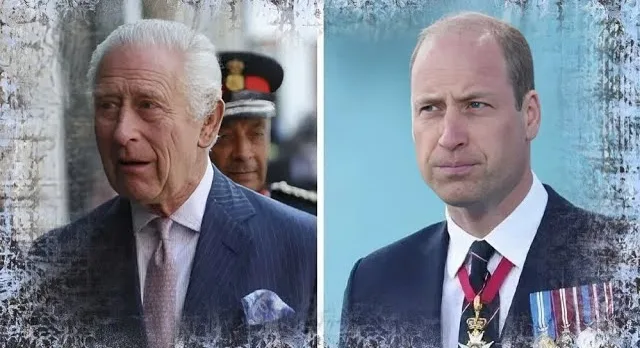Prince William displays kingly maturity by warming up to Queen Camilla, prioritizing his father King Charles’ happiness
In a display of remarkable maturity and devotion to his father, Prince William has made a significant compromise by embracing a closer relationship with Queen Camilla. This development marks a major shift in the dynamics of the royal family, as William has gradually grown closer to Camilla, a figure who once represented a challenging chapter in his family’s history.
Prince William first met Camilla Parker Bowles in 1998, at the tender age of 17. According to royal expert Christopher Andersen’s book, The King: The Life of Charles III, that initial encounter left Camilla “shaking like a leaf.” At the time, both William and his younger brother, Prince Harry, were deeply affected by their mother, Princess Diana, public struggles with the affair between Camilla and then-Prince Charles. The brothers’ reluctance to accept Camilla was understandable, given the pain their mother endured.
However, the royal landscape has changed significantly since then. Following Prince Harry’s decision to step down as a working royal in 2020, Prince William has reportedly grown closer to Camilla. Sources close to the Parker Bowles family reveal that William has gradually “warmed up” to his stepmother, and they now enjoy what can be described as a “familial relationship.” This is a far cry from the distant and strained relationship that once existed between them.
Much of this thawing can be attributed to the influence of Princess Kate, who has played a pivotal role in fostering a more harmonious relationship between William and Camilla. According to insiders, Kate was “accepting of Camilla long before others in the royal family,” which has helped ease tensions and pave the way for a more united front within the family.
The relationship between William and Camilla has grown even more significant in recent years, particularly after both King Charles and Princess Kate faced their cancer diagnoses. In the wake of these health challenges, their spouses have taken on additional royal duties, demonstrating their commitment to supporting the monarchy during difficult times. The cordial relationship between William and Camilla is said to be maintained for the sake of King Charles, who, despite the complex history, has found happiness with Camilla.
An insider close to the royal family summed up the situation by stating, “If his dad’s happy, William is happy.” This sentiment underscores William’s dedication to his father’s well-being and his willingness to set aside past grievances for the greater good of the family and the monarchy.
Analysis:
Political:
Prince William’s decision to embrace a closer relationship with Queen Camilla can be seen as a politically astute move within the royal family. As the future king, William’s actions reflect his understanding of the importance of unity within the monarchy, especially in the face of public scrutiny. By fostering a positive relationship with Camilla, William is not only securing a stable future for the royal family but also demonstrating his readiness to assume the role of monarch. This compromise is likely to bolster public confidence in the continuity of the monarchy, as it shows that William is capable of navigating complex family dynamics with grace and maturity.
Social:
Socially, Prince William’s warming relationship with Queen Camilla mirrors broader societal shifts in attitudes towards blended families and the complexities that come with them. Many families today navigate similar challenges, where past conflicts are set aside in favour of creating a harmonious environment for all involved. William’s ability to move past old grievances and accept Camilla as part of his family sends a powerful message about forgiveness, acceptance, and the importance of familial bonds. This evolution in their relationship also humanizes the royal family, making them more relatable to the public.
Racial:
While race is not directly involved in this particular story, the broader implications of Prince William’s actions can resonate with discussions on inclusion and acceptance within families. By embracing Camilla, who was once a polarizing figure in the royal family, William is demonstrating the value of inclusivity, even when faced with difficult personal histories. This approach can serve as an example for fostering understanding and integration within families and communities that are diverse in their backgrounds and experiences.
Gender:
Gender dynamics also play a role in this story, particularly in how Princess Kate’s influence has been instrumental in mending the relationship between William and Camilla. Kate’s early acceptance of Camilla highlights the often underappreciated role that women play in maintaining and nurturing family relationships. Her actions have not only contributed to a more united royal family but also underscored the importance of emotional intelligence and diplomacy in managing complex familial ties. Additionally, both William and Camilla’s increased involvement in royal duties, especially after health challenges, reflects the evolving roles of men and women in leadership and caregiving within the family and the monarchy.
Economical:
From an economic perspective, the strengthened relationship between Prince William and Queen Camilla could have positive implications for the royal family’s public image and, by extension, their financial stability. A united royal family is more likely to garner public support, which is crucial for the continuation of the monarchy’s funding through public means. The perception of a stable and harmonious royal family can also boost tourism, merchandise sales, and other economic activities associated with the monarchy. Moreover, William’s willingness to compromise and prioritize his father’s happiness may enhance his appeal as a future king, potentially increasing the royal family’s economic influence both in the UK and abroad.
